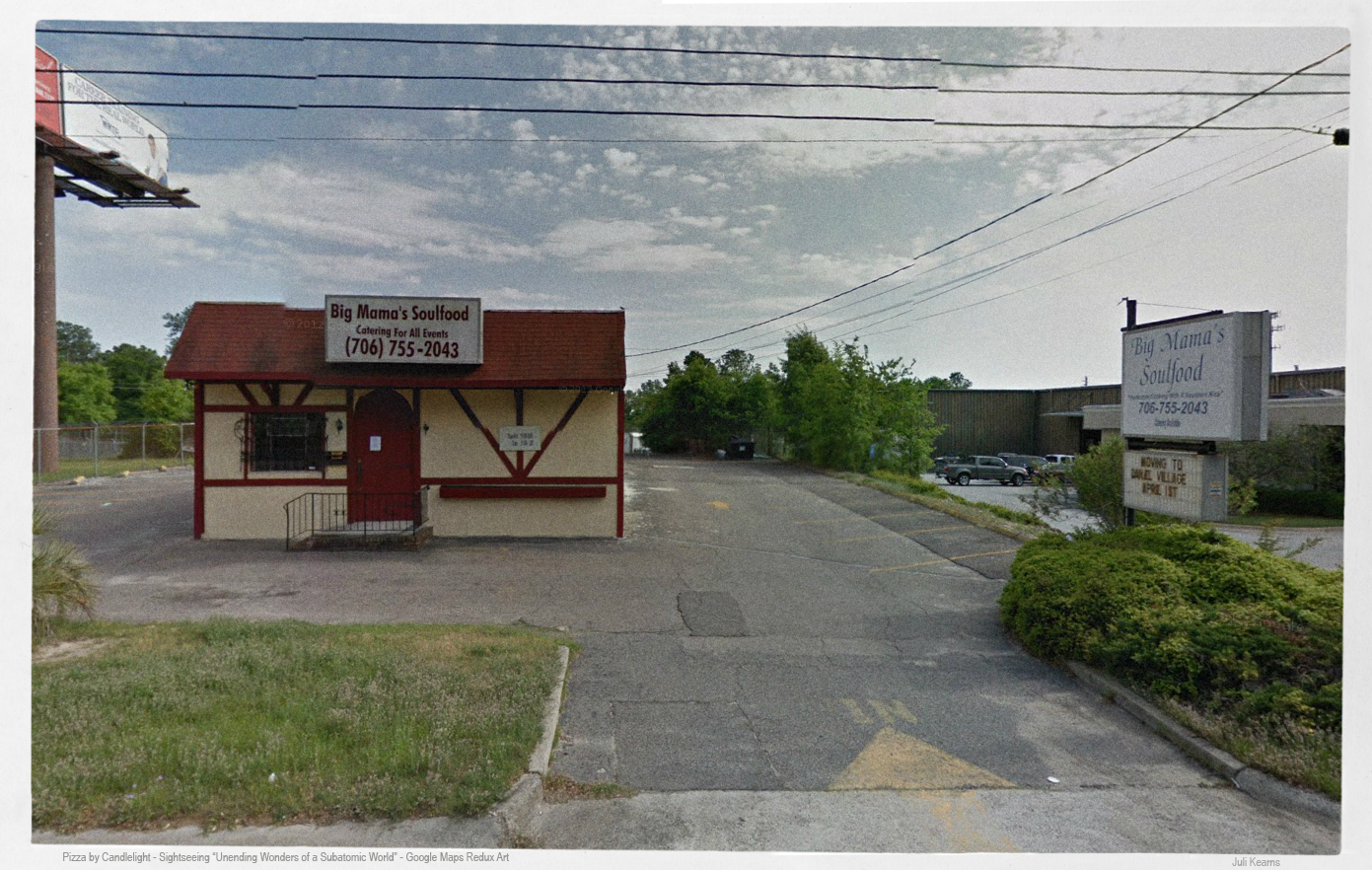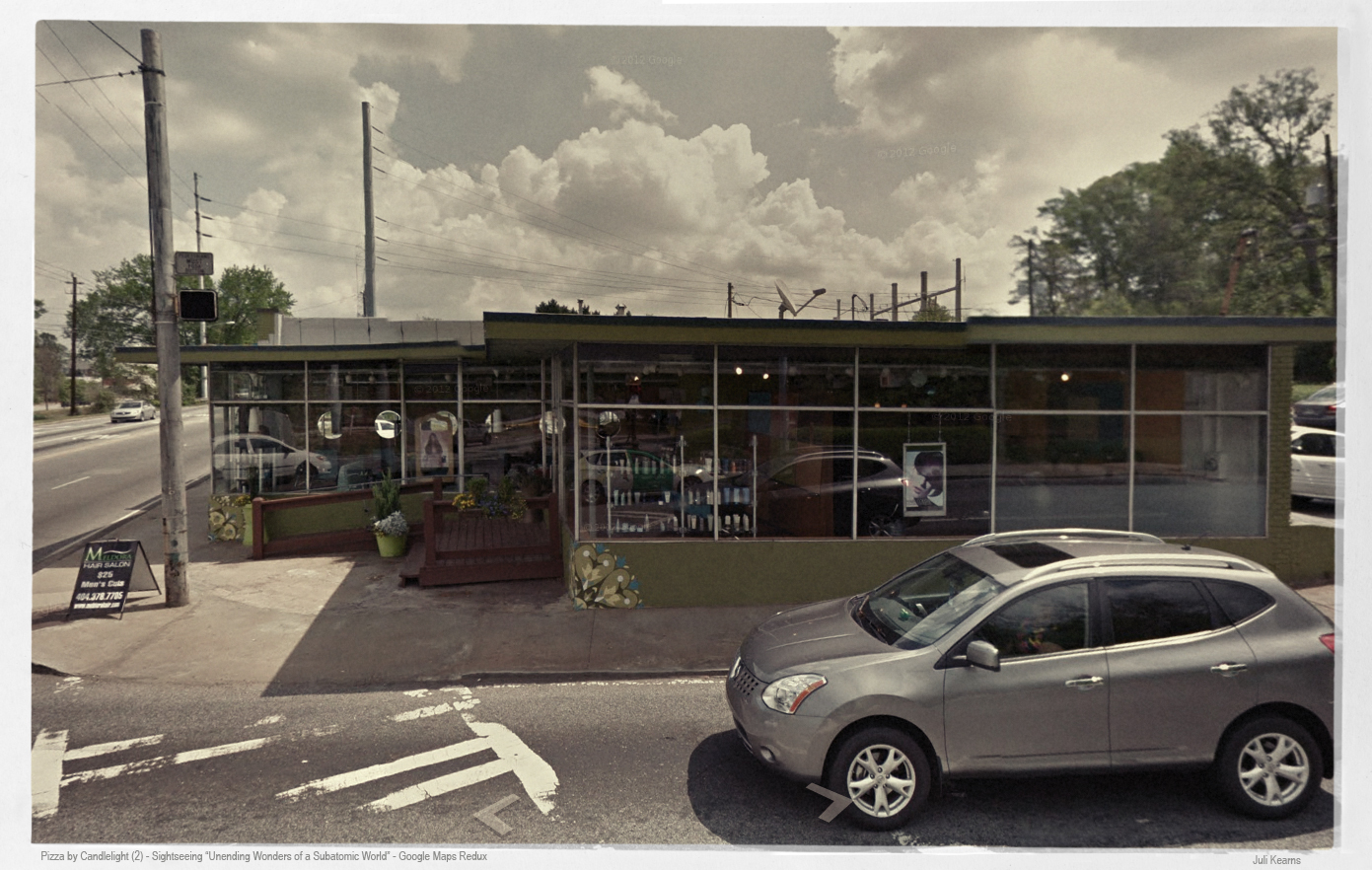
Is it bad form and considered demythologizing fiction for a writer to point to inspirations even when they are only fragmentary, which most inspirations are?
These two images document the inspirations for the restaurant-bar at which working-homeless Chance Hope is employed at the beginning of Unending Wonders of a Subatomic World.
How many years ago did I come up with the kernel of the idea for this working homeless woman, and, sadly, she is no less relevant today. Even far more so. Which I'd anticipated she might be and hoped that she wouldn't. But people weren't talking much about the working homeless when I first conceived of Chance in her working homeless predicament. Her situation was still past the fringe edge of public consciousness. I bunked with her in her home of a car using all that I knew about living on the road in music as resource, plus my imagination for having no home, having been in a situation like that when I was very young and in high school and had nothing to call my own but the clothes on my back. She had to be resourceful and adaptable, but strength may only be as fragile as a coffee cup on which one pins their idea of "home". As long as I have this familiar friend of a coffee cup, I have "home".
And then she loses even that.

The fictitious town where the story begins, I named Valentine, as Valentine's Day is a holiday that advertises much and leaves so many out in the cold. Plus, I once knew a heartless woman named Valentine.
Valentine, based on a real place, imagines itself to be charming seaport city, only it's up the river and without a functioning port, and no ocean. Keep this in mind when I tell you this restaurant in the top photo used to be a very popular, perceived to be a romantic (yes) German-Italian restaurant. The kind where one would take their valentine for a date. They served exotic (non-American) beer. They served German sausages and would put two real pepperocinis in your iceberg lettuce salad. The exterior of the restaurant looked no different than it does today--or not much--with the exception that the parking lot was always full, because there was just about no where else in town to get German food, and nowhere else in town to get Italian food that wasn't a petri dish of kiddie-pizza-party germs and/or a hole in the wall. Which should tell you something else about Valentine. The wrought iron and the tavern lights were considered an elaborate touch of "ethnic" charm. That also should tell you something about Valentine.
No one would ever catch it, as the works are worlds apart, but I also named the so-called-city Valentine as a reference to Picnic at Hanging Rock, in which several girls and a woman go missing. However, I never thought of the main characters, Chance and Faith, as missing, as I was always with them and knew where they were and what they were doing. With the book I've been currently working on, that isn't the case. But as I was always in the car with Chance and Faith, traveling from place to place, they were always on a map. I could point to this or that longitude/latitude and say exactly where they were.
The first establishment pictured had no flaming fire torches outside, for which reason fusion with a second inspiration, in another city, a one time Italian restaurant that did have burning torches in front. After other successful and not-so-successful business tenants, now a beauty salon, the building has long since stopped bearing any resemblance to the yellowish stuccoed spaghetti and pizza joint it once was, where I only ate once, and barely recollect that once because the flame outside had so captured my imagination. Because fire is mysterious. So it became part of the DNA of the bar-restaurant where Chance is working when she loses it all, every last thing in the world she could call home.
When one is stripped down to one's skin, possessing nothing else but a name and one's peculiar, private history that no one else can share, and one's belief system, an individual might be shocked to discover how tenuous the "I" is. And I do mean stripped down to one's flesh, when there's nothing in storage waiting for you, and there aren't even the clothes on one's back to provide a means of self-identification and broadcast at least a slim sense of that self-identification to others. Most will think, "I'm stronger than that. I'm stronger than my belongings. Take away my home, my things, my clothes, I will still have me. A person would have to be pretty weak to not still know who they are." They'd be surprised. I was reading an article today on how some few who have chosen to remain at their homes in Fukushima, elderly who aren't as susceptible to the radiation or haven't the years left to worry about experiencing the long-term effects, are faring better emotionally than those who were evacuated and lost the self-identifying territories of home, job, possessions and local interests. "Think of the freedom to become who you really are and want to be," someone else might insist. Well, that depends, doesn't it, and I still say it's not a matter to be taken at all lightly, or frivolously.
If one stands not at the epi-center of the universe, and if all is in permanent flux, then one had better catch hold of a good flotation device. But you've no assurance your rubber duck inner tube might not turn into a killer whale.
Return to this book's main page for more information, FAQ, and the first chapter in PDF form.
Return to "Sightseeing" Unending Wonders of a Subatomic World (or) In Search of the Great Penguin.
